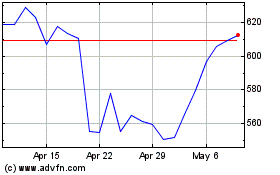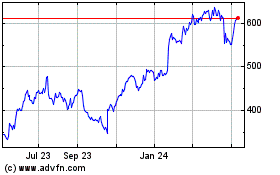By Lillian Rizzo and Joe Flint
Think twice before sharing that Netflix password.
The streaming service for years turned a blind eye to password
sharing, but recently started prompting some of its users to verify
their identity through a text message.
Netflix Inc.'s rivals, including AT&T Inc.'s HBO Max, Walt
Disney Co.'s Disney+ and Comcast Corp.'s Peacock, often email their
customers when they notice multiple logins from various locations,
according to people familiar with the companies' policies. The
emails usually say that the service wants to ensure the user's
account wasn't hacked, the people said. But they also serve as a
gentle reminder to customers that companies know when more than one
person is using the account, industry experts said.
Netflix's efforts to prevent password sharing come as the
streaming field grows more crowded and competitors amass more
subscribers. Recently Disney+ surpassed 100 million global
customers.
A Netflix spokesman declined to say whether all users would see
verification requests, only saying that the effort was designed to
help ensure that people using Netflix accounts are authorized to do
so. Netflix hasn't cut off any subscribers for sharing a password,
a person close to the company said.
With more than 200 million subscribers -- nearly 74 million of
which are in the U.S. and Canada -- Netflix is running out of room
to grow in North America if it doesn't nudge all of its users to
pay for a subscription. Many industry experts said it was only a
matter of time before Netflix got tougher on password surfers, who
are costing the company subscribers and revenue.
"They have gotten away with it for years," said Neil Begley, an
analyst at Moody's Investors Service, of streaming freeloaders. "If
free is over, most people won't begrudge the company for capturing
its due revenues."
Password sharing is so common that it is part of the cultural
zeitgeist. During a 2018 Netflix special, the comedian Ali Wong
joked that she watched her previous Netflix special using her
sister-in-law's login. "To this day, I do not have my own account,"
the comedian said at the time.
When the NBC talk-show host Jimmy Fallon introduced Peacock at a
NBCUniversal event in New York last year, he pretended to use the
credentials of the company's chairman to log in. "I can't wait for
us all to log in on the same account," he told the audience.
Password sharing costs companies a lot of money. U.S. streaming
platforms lost an estimated $2.5 billion in revenue in 2019 because
of password sharing, and that amount is expected to increase to
$3.5 billion in 2024, according to Parks Associates, a research
firm.
Leichtman Research Group reported that 30% of Netflix
subscribers share their passwords, while 23% of Disney-controlled
Hulu's subscribers and 20% of Amazon.com Inc.'s Prime users share
their account credentials, based on a survey of nearly 2,000 people
between June and July 2020.
The proliferation of new services has likely made the issue more
pressing. The number of major platforms more than doubled in the
past year and a half, increasing the incentive to trade one login
for another.
Just a couple of years ago, all it took was a Netflix
subscription to watch "Friends," "The Office" and "Grey's Anatomy,"
which The Wall Street Journal in 2019 reported were the
three-most-watched shows on the platform. Users today would have to
subscribe to three separate services -- HBO Max, Peacock and
Netflix -- to watch all three, at a collective cost that ranges
from about $28 to $42 a month, depending on the pricing plan
chosen.
All streaming services allow for a certain amount of concurrent
streams, making it possible for customers to share their account
without too much frustration. Netflix offers tiered subscriptions
that allow more simultaneous streams on a single account. At the
cheapest tier, $8.99, one person can watch at a time, while the
most expensive tier, $17.99, allows four viewers at once.
Bradley Jasper, a 30-year-old salesman in Altoona, Pa., said he
subscribes to a handful of streaming apps including Netflix and
Hulu and watches Disney+, ESPN+, Apple Inc.'s Apple TV+ and
Discovery Inc.'s Discovery+ by using promotional offers. He shares
his accounts with a few friends and family members.
"I feel that as someone who pays for the four-user account, I
shouldn't be punished for actually sharing," said Mr. Jasper,
referring to Netflix.
According to Netflix's terms of use -- which every customer must
sign off on when setting up any account -- any content viewed is
for the account holder's "personal and non-commercial use only and
may not be shared with individuals beyond your household."
The Covid-19 pandemic, which had millions of Americans hunkered
down at home for months on end, led to growth for streaming
platforms but likely exacerbated the password-sharing problem,
according to analysts.
"The covid pandemic caused a few things, an acceleration in
streaming is one of them," said Mark McCaffrey, PwC's U.S.
technology, media and telecommunications sector leader. "The
services that feel they've gained a pole position are now trying to
figure out if they have the ability to recapture lost revenue."
Netflix's stance on password sharing has evolved as the company
has grown. In 2016, co-founder and co-chief executive Reed Hastings
told investors that account sharing was something "you have to
learn to live with because there's so much legitimate password
sharing, like you sharing with your spouse, with your kids. So
there's no bright line, and we're doing fine as is."
The company's attitude had changed by 2019, when Chief Product
Officer Greg Peters told investors that the company was monitoring
password sharing and figuring out "consumer-friendly ways to push
the edges on that." At the time, he said Netflix had no big plans
to announce any changes.
Bruce Leichtman, media analyst at Leichtman Research Group, said
Netflix needs to balance the benefits of making it easy to share an
account with the effect it has on subscriber growth.
"Most streaming services will need to look at these trade-offs
as they grow," he said.
Write to Lillian Rizzo at Lillian.Rizzo@wsj.com and Joe Flint at
joe.flint@wsj.com
(END) Dow Jones Newswires
March 18, 2021 05:44 ET (09:44 GMT)
Copyright (c) 2021 Dow Jones & Company, Inc.
Netflix (NASDAQ:NFLX)
Historical Stock Chart
From Mar 2024 to Apr 2024

Netflix (NASDAQ:NFLX)
Historical Stock Chart
From Apr 2023 to Apr 2024
